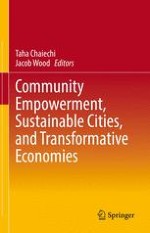2022 | OriginalPaper | Buchkapitel
Financialisation and Environmental Goals of 2030 Agenda
verfasst von : Mateusz Racławski
Erschienen in: Community Empowerment, Sustainable Cities, and Transformative Economies
Verlag: Springer Nature Singapore
Aktivieren Sie unsere intelligente Suche, um passende Fachinhalte oder Patente zu finden.
Wählen Sie Textabschnitte aus um mit Künstlicher Intelligenz passenden Patente zu finden. powered by
Markieren Sie Textabschnitte, um KI-gestützt weitere passende Inhalte zu finden. powered by
